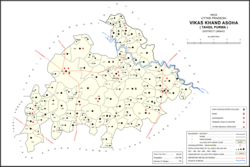Kantha, Unnao
 From Wikipedia - Reading time: 6 min
From Wikipedia - Reading time: 6 min
Kantha
Kāntha | |
|---|---|
Village | |
 Map showing Kantha (#406) in Asoha CD block | |
| Coordinates: 26°34′55″N 80°45′16″E / 26.581933°N 80.754345°E[1] | |
| Country India | |
| State | Uttar Pradesh |
| District | Unnao |
| Area | |
• Total | 21.551 km2 (8.321 sq mi) |
| Population (2011)[2] | |
• Total | 9,973 |
| • Density | 460/km2 (1,200/sq mi) |
| Languages | |
| • Official | Hindi |
| Time zone | UTC+5:30 (IST) |
| Vehicle registration | UP-35 |
Kantha is a village in Asoha block of Unnao district, Uttar Pradesh, India.[2] It hosts two small melas,[3] one of which is the Mahabirji-ka-Mela, held every Tuesday during the month of Jyaistha.[4] People bring sweets, toys, and other items to sell at the fair.[4] Kantha also hosts a market twice per week, on Mondays and Fridays, with vegetables being the main item of trade.[4] As of 2011, the population of Kantha is 9,973, in 2,079 households.[2]
History
[edit]Kantha was historically the largest village in Asoha pargana.[3] About 900 years ago a Lodha named Kantha is said to have cleared off the jungle which surrounded this place and people in. The name is derived from that of its founder.[5]
References
[edit]- ^ "Geographic Names Search WebApp". Search for "Kantha" here.
- ^ a b c d "Census of India 2011: Uttar Pradesh District Census Handbook - Unnao, Part A (Village and Town Directory)". Census 2011 India. pp. 323–47. Retrieved 9 July 2021.
- ^ a b Nevill, H.R. (1903). Unao: A Gazetteer, Being Volume XXXVIII Of The District Gazetteers Of The United Provinces Of Agra And Oudh. Allahabad: Government Press. pp. 149–50. Retrieved 9 July 2021.
- ^ a b c Census 1961: District Census Handbook, Uttar Pradesh (37 - Unnao District) (PDF). Lucknow. 1965. pp. 152, 158, xcvi-xcvii of section "Purwa Tehsil", cxxvi. Retrieved 9 July 2021.
{{cite book}}: CS1 maint: location missing publisher (link) - ^ Government of Uttar Pradesh (1877). Gazetteer of the Province of Oudh, Volume II -H to M. Allahabad, North-Western Provinces and Oudh Government Press. p. 111.
Licensed under CC BY-SA 3.0 | Source: https://en.wikipedia.org/wiki/Kantha,_Unnao11 views | Status: cached on February 28 2025 07:40:48↧ Download as ZWI file
 KSF
KSF